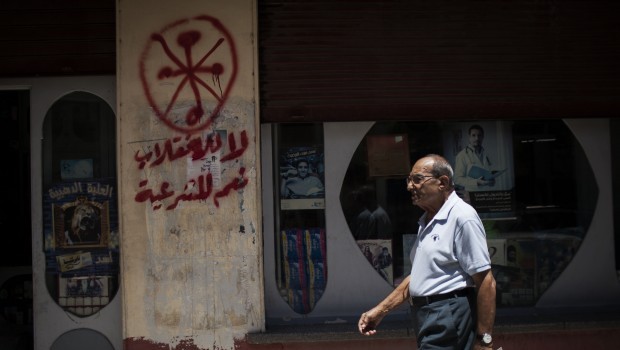
An Egyptian man walks in front of a pharmacy marked with anti-Coptic and anti-coup graffiti in Assiut, Upper Egypt, Tuesday, Aug. 6, 2013. The Arabic grafitti reads, “No to the coup, yes to legitimacy.” (AP Photo/Manu Brabo)
Churches across Egypt were set on fire Wednesday morning in reaction to the dispersal of the Muslim Brotherhood demonstrations at Rabaa Al-Adawiya and Al-Nahda Square (Giza). This was perhaps inevitable since attacks on churches and Egyptian Christians have escalated since June 30 this year. In one incident last week, a ten year old girl called Jessica Boulos was shot as she left church. In various locations throughout the country churches and Coptic properties have been attacked and burned down. While this does not command the attention of Arabic or English-language media in the same way as questions over the legitimacy of removing Mohamed Mursi or using aggressive measures against Muslim Brotherhood protesters, it has implications for Egypt’s future stability that should be taken far more seriously as a fundamental challenge to any hope of a genuine democratic transition.
According to the Muslim Brotherhood, Copts were major supporters of the removal of Mursi in early July because they seek to destroy Egypt’s Islamic identity. In a statement on their website, the Brotherhood claim that Pope Tawadros’ support for General Abdul Fattah El-Sisi was bought with the promise of the cancellation of any articles that underscore Islamic identity in the new constitution. Meanwhile graffiti sprayed onto the walls of churches by pro-Mursi demonstrators during their attempted marches to Ramsis and Heliopolis declare that Egypt is Islamic and that Pope Tawadros is a traitor. Such accusations are being made openly but neither they, nor the attacks on Copts, are being sufficiently condemned or debated.
A series of failures have allowed such attacks and accusations to continue unchallenged. The first is the failure to adequately address religious discrimination, which is problematic for a transitional government that gained a mandate at least partly based on confronting terrorism and religious fascism. The Muslim Brotherhood’s incitement against Christians has not been sufficiently tackled even while the government continue to blame the Brotherhood for all their ailments. Yet attacks on Copts is a major symptom of religious fascism that must be part of the package of measures used to firmly reject this phenomenon and eject it from Egypt’s future.
The political response is so far failing, and so is the security response. According to an Amnesty International briefing published in July “security forces left six besieged [Coptic] men—four of whom were then killed and one hospitalized—to the mercy of an angry crowd,” during an incident in Luxor. This is disturbingly reminiscent of reports into previous incidents, under both Mubarak and Mursi. Security services have clearly not developed any new strategies to counter attacks on Copts and there is apparently no social or political will to do so.
The third failure is that of the international community. The international community is fixated on the rights of the Muslim Brotherhood and condemning violence against Mursi supporters and is failing to put pressure on Egypt to address the targeting of Copts with physical violence and hate speech. While demanding that the Muslim Brotherhood should have a place in the democratic process the international mediators are ignoring the importance of emphasizing democratic values and the implementation of a culture of rights and human security for all citizens in Egypt. Without a democratic culture Egypt will remain prone to instability because this focus on mechanisms rather than values will not guarantee equality, inclusion or social justice.
The final failure is that of the Coptic Church itself. In response to an incident in Beni Ahmed Al-Sharqiya in early August during which a church and a number of houses were attacked, a reconciliation meeting was held between local Muslim Brotherhood and Church leaders. As a result of the meeting, the church agreed that the case raised by Copts against the alleged attackers would be dropped. This use of reconciliation meetings has been used repeatedly in recent decades to defuse sectarian tensions by agreeing that the victims of attacks drop their cases and in some instances even face eviction from their homes.
The continuation of these same strategies at the levels of the state, the security services, the international community and even the church can only be explained by the assumption that issues concerning Copts can be delayed while the apparently bigger issues, such as the future role of the Brotherhood and the date of elections, is determined. It is not only the successive leaders but also society that is behind this attitude. After Mubarak’s ouster there was another spike in attacks on Copts and Coptic property and churches. When Copts organized demonstrations a public narrative emerged that condemned such protests to protect Coptic rights as ‘factional demands’ that should come second to Egypt’s transition to democracy. The argument went that once Egypt had become democratic then Copts would have a legitimate right to campaign.
Yet inequalities and the democratic deficit will persist for all Egyptians, as long as all Egyptians are unable to see each other as equals regardless of religion (or gender). Mohamed El-Baradei, who resigned yesterday as Egypt’s vice-president, opposed the forceful dispersal of the Muslim Brotherhood’s sit-ins because he argues human rights must be applied to all. Yet this language of rights is not readily transferred to Coptic Christians when they come under violent attack. Despite slogans claiming national unity in Egypt’s current legal, social and political culture the fact remains that “all Egyptians are equal, but some are more equal than others.”
